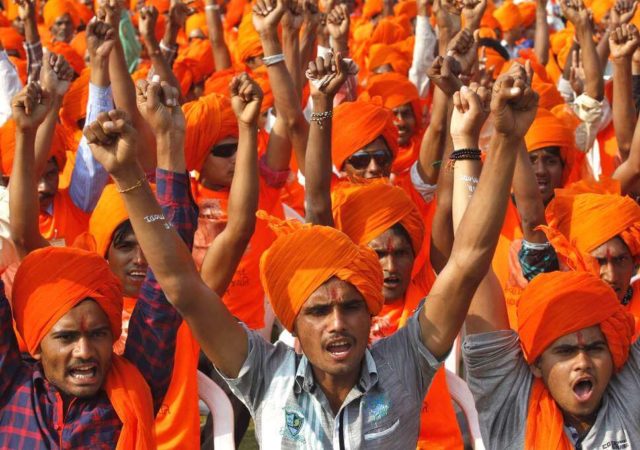By Abhimanyu Chandra
Picking up from the first two parts of this series (We Got An Eminent International Scholar Talking About Islamophobia, Hindu Nationalism & Elections’19 AND We Got An Eminent International Scholar Talking About Hindu Terror & Allegations Of Muslim Appeasement), where I engaged on a wide-ranging, very interesting conversation with eminent Scholar Christophe Jaffrelot on Islamophobia, Muslim appeasement, and Elections 2019, this section talks about Hindu nationalism and the current elections.
Christophe Jaffrelot is a Senior Research Fellow at CERI-Sciences Po/CNRS, Paris, Professor of Indian Politics and Sociology at King’s India Institute, London, and Non-resident Scholar at the Carnegie Endowment for International Peace.

PART 3:
ON HINDU NATIONALISM AND THE CURRENT ELECTIONS
AC: I want to transition kind of more directly to the topic of Hindu nationalism, which is of course an area where you have written an enormous amount about. From whatever we can gauge from statements by Hindu nationalist leaders, it becomes immediately apparent that they know next to nothing about Muslims and Islam. And we’ve discussed a little bit of this, but just one example of this is this constant treating of Muslims as a monolith.
Where common sense, ground experience, scholarly literature says there is enormous internal diversity along a hundred different axes. So why are Hindu nationalists ignorant about Islam and Muslims? How do we understand this?
CJ: Well, they are ignorant because they have not interacted with them, and of course, as a result they otherize them even more. But it’s also tactical.
It’s a tactic to say look, the Muslims are so united that the real minority are not them, but the Hindus, who are so divided according to caste and sects.
Not only Islam is diverse in India, but even more importantly, there is a Muslim identity in India, that is different from what is generally portrayed. Sufism remains the main identity tag of Islam in the country. If forms of orthodoxy have made inroads among Indian Muslims, this process has not resulted in the making of a strong Salafi movement. Muslims of India are not fighting in Syria. Have not fought in Afghanistan. So not only there is diversity, but there is a culture of Islam in India, the dargah culture, that is not posing any threat to Hinduism.
In fact, dargahs are still places where Hindus go. The dargah culture is typical of the Hindustani culture. The brand of Islam you have in India is more Indian than Islamic in many ways.
AC: If you had to estimate what percentage of Indian Hindus sort of share this non-understanding of Islam, or let’s just say what percentage of Indian Hindus are Hindu nationalist, what would your estimate be?
CJ: Oh that is very difficult because it depends what you mean by that.
AC: Yeah.
CJ: You know BJP supporters have never been more than 31% of the country. Among these BJP supporters, many were not Hindu nationalist. They voted for other reasons than its ideology for the BJP – because of seat adjustment, because of clientelistic relations. So for instance the 20% Muslims who supported BJP in Gujarat, or the 6% Muslims who supported BJP in 2014 are not Hindu nationalist, by definition.
AC: Yes, yes.
CJ: Sikh people, same. The first-past-the-post system gives power to people who are not necessarily in a majority. Secondly, there is huge divide between north India and south India. These 31% gave power to BJP simply because the party did well in the north and in the west, but could hardly make inroads in the south, except in Karnataka.
AC: Just probing further on two things which kind of relate directly to Hindu nationalism, I think. One is, certainly in north India, it’s commonplace to hear people, they may or may not think of themselves as Hindu nationalists, that’s another thing, but people referring to Muslims as “Ms”. Which suggests a kind of a de-humanisation or tagging or something. How do we understand that?
CJ: There is a sense of insecurity that is very deeply rooted in the psyche of some Hindu men. In his autobiography, Gandhi narrates how he started to eat meat secretly for being as strong as this Muslim friend. Hindu nationalists tend to consider that because Muslims are non-veg, they are stronger and more aggressive. This complex of inferiority found expression in the anti-Love Jihad movement.
Second you have the conversion problem. Muslims are seen as proselyte and this image – that is not supported by any substantial empirical evidence today – can affect people who are not following the Hindutva ideology but who feel insecure.
This feeling may also be fostered by the fact that Muslim countries are seen as encircling India – and China supporting Pakistan makes it even more problematic.

Read More: RSS’ Joint Secretary Writes How Hindu Rashtra Doesn’t Mean They Don’t Want Muslims In It
AC: On this idea of encirclement by kind of Islamic countries, one of the thoughts expressed by you know Hindu nationalist people generally is that minorities in Islamic countries enjoy very limited, restricted rights. Hence, why should there be a clamour for minority rights in India for Muslims. When let’s say Hindus in Saudi Arabia for example enjoy second class status or whatever.
CJ: In fact you have two problems there. One is, we are victims elsewhere as Hindus. So, why can’t Hindus impose over Muslims the same treatment Muslims of the Gulf countries impose over Hindus.
But you have the same way to look at things not only geographically but historically: “We have been dominated by Muslims, now it is our turn”.
Hindu nationalists live in history, and it’s one of the reasons for the de-humanized way they look at the other. The other is not the man I have in front of me, but an exemplar of the oppressors who ruled India several centuries ago. So you don’t see the person but a representative of a specie who has to now be treated badly because it is treating us badly in neighboring countries and it has treated us badly in the past. This is what I call de-humanisation, because the human being you have in front of you does not exist as a human being, he is not seen as a person. This is why he may be submitted to so savage forms of violence in the course of riots, pogroms or lynchings.
AC: We’ve talked about a range of issues Professor Jaffrelot relating to Hindutva, Hindu-Muslim relations, and more. My last question is, how can Hindu-Muslim coexistence be furthered going ahead, keeping in mind that the remaining days of this government, you know, this has been a very Hindu nationalist government and there is reason to believe that there is a good chance that the BJP and this government will be in power for the next five years as well.
So, in that context, how do we further Hindu-Muslim coexistence? And, and, even if this current government doesn’t come to power, these problems, many of these problems are structural, so…
CJ: Well, one thing that has become very important is to enforce the laws of the republic. Because if you enforce the laws, the principles of citizenship will come back, and the question of coexistence will be much easier to solve.
Then of course, the main thing is social. And education should play a big role in changing the vision of the other.
Thirdly, Hindus and Muslims live next to each other peacefully the moment they not only respect each other, but also consider that in politics the real issues are not identity-related, but social and economic – and that you need good policies more than identity politics.
The antidote to Hindu nationalism will come from the resurgence of socio-economic issues, be they class-based or caste-based.
One day, people may be tired of looking at ourselves as Hindus or Muslims, but will look at themselves as workers, jobless, landless peasants.
But this is precisely what political entrepreneurs instrumentalising identity try to avoid in order, not only to win elections by exploiting the fear of the other, but also to maintain social hierarchies.
This transcript has been edited and condensed for clarity.
Author Bio: The interviews are entirely conceptualised and conducted by Abhimanyu Chandra, who is a Ph.D. student at the University of Chicago.
Other Recommendations:
Why Has Lucknow Not Witnessed A Hindu-Muslim Riot In 100 Years Despite Mixed Population?




























